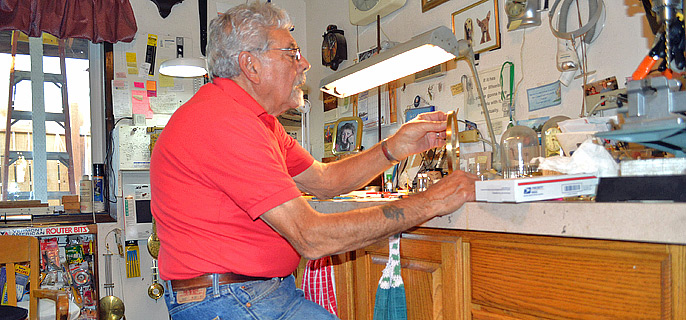
[quote style=”2″]Dick Jackson Brings Dead Clocks Back to Life[/quote]
Dick Jackson has no excuse for ever being late to anything. After all, the Hermiston man has 100 or more clocks in his house.
“It’s a sickness,” Jackson explains, without the slightest bit of embarrassment.
In fact, the first thing you notice when you step into the home he shares with his wife, Terri, is the sound.
Tick tock, tick tock, tick tock – only to be occasionally interrupted by the sound of chimes.
Jackson, however, has long since tuned it out.
“Terri and I can sit here and we don’t ever hear the clocks,” he said. “Except when the house goes silent. Then I know I’ve got some winding to do.”
PHOTO GALLERY: Clocks, Clocks and More Clocks
There’s hardly a space in the house that isn’t occupied by one of his clocks. They’re on the floor, the walls, mantles, shelves, dressers – there’s even a 13-foot-tall street clock featured prominently in the backyard.
Jackson, 80, became fascinated by clocks back in the early 1970s when he was an entomologist for Washington State University. His neighbor had a clock that wasn’t running, and even though he had never worked on a clock before, Jackson told the man he could fix it.
“I’d always tinkered with things like model airplanes and motorcycles,” he said. “But I took this clock apart and thought, ‘Oh – I’m in over my head.’ It took me a while, but I was able to get it running and in the process I figured out how a clock works.”
Encouraged by his initial success, Jackson took on a much bigger challenge when he was visiting an antique shop in the little town of Albion, Wash., just outside of Pullman.
“The woman running the shop had a bunch of old clocks that were dead,” Jackson said. “I asked if she’d like me to bring ‘em back to life.”
Before he knew it, he had himself a new hobby. It wasn’t until later, however, that Jackson began collecting clocks. In fact, when he arrived in Hermiston in 1985 to work for the Oregon Department of Agriculture he had but one clock in his possession.
“I really enjoyed fixing them,” he said. “But everyone once in a while I’d have the opportunity to pick one up for a song.”
After a tour of his home, one can’t help but come to the conclusion that Jackson knows a lot of songs. Jackson’s collection includes a floor lamp with a built-in clock, a Lenzkirch clock from 1875, a Swedish Cartel from 1950, a World War II Navy chronometer, and the oldest clock in his possession – a 1790 French clock inlaid with mother of pearl.
And Jackson knows them inside and out. The Lenzkirch clock, for example, consists of 223 individual pieces of wood. Jackson knows this because Jackson counted them.
He and Terri would pick up a clock here or there during their visits to antique shops. The clocks typically needed work, which is the way Jackson likes it. That gave him the opportunity to take a dead clock to his shop and disassemble it, polish the pivots, clean out the various parts and get it back in beat.
Eventually, Jackson had to stop buying clocks.
“We ran out of room for them,” he said. But he’s never stopped working on them. In fact, he spends up to 20 hours a week fixing up clocks – most of them belonging to others.
“It’s really mostly word of mouth,” he said, referring to his customers. “People hear I fix clocks and they call me up.”
Jackson used to fix clocks for free – or in exchange for a nice bottle of wine. But Terri convinced him that he should start charging for his work (“Repairing clocks is a lost art,” she says), though he admits his rate is a bargain. He has loyal customers from around the Northwest who insist that Jackson – and only Jackson – work on their clocks. Currently in his shop are three clocks from a woman from Everett, Wash., and another from a customer in Prosser, Wash.
Jackson not only gets the clocks running again, he often returns them to their owners along with the clock’s history – who made it, where it was made and when.
“People love it when you send them home with their clock and all the background,” he said.
“I just really enjoy it,” he said. “There’s not a week goes by that someone doesn’t tell me how envious they are of me to have a hobby like this.” He continues to marvel at the intricate craftsmanship of a finely-made watch.
“At one time, a fine clock was the finest machine in the world,” he said. “Nothing beat the technology of a clock that would run a full year on a single winding. If that wasn’t technology at its finest, I don’t know what was.”
Jackson said you have to have the right personality to work on clocks.
“You have to have the patience of Job and you cannot be withered by disappointment,” he said.










